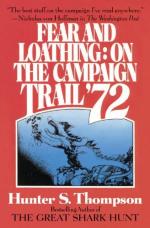
|
| Name: _________________________ | Period: ___________________ |
This test consists of 15 multiple choice questions and 5 short answer questions.
Multiple Choice Questions
1. During "January," what does Thompson say was inappropriate during the previous social setting?
(a) His clothing.
(b) The date of the event.
(c) The socialites who would be present.
(d) Whether to bring a date or not.
2. To what does Thompson compare an American campaign trail?
(a) A hockey team.
(b) A football team.
(c) A baseball team.
(d) A chess game.
3. According to Thompson, who was most notably not a target when Bobby Kennedy was assassinated?
(a) Lyndon Johnson.
(b) Rosey Grier.
(c) George Meany.
(d) George Wallace.
4. Whom does Thompson describe as being less of a hand-shaker and more of an actor with his constituents?
(a) Ted Kennedy.
(b) George McGovern.
(c) Edmund Muskie.
(d) George Wallace.
5. When covering political stories, how does Thompson generally feel around large groups of unconnected people who cannot mix well?
(a) Awkward.
(b) Claustrophobic.
(c) At ease.
(d) Happy.
6. According to Thompson, how much time do the candidates devote to meeting constituents?
(a) Eight hours a day, for two years.
(b) Ten hours a day, for fourteen months.
(c) Eighteen hours a day, for a year and a half.
(d) Twelve hours a day, for a year.
7. Throughout "March," which politician does Thompson particularly focus on?
(a) Edmund Muskie.
(b) George Wallace.
(c) John Lindsay.
(d) Ted Kennedy.
8. What is particularly colorful about the letter exchange in "July?"
(a) Thompson includes a few tabs of acid with the letters.
(b) Thompson reveals some secrets about Eagleton.
(c) Thompson manages to call his correspondant by several filthy names.
(d) Thompson reveals the sordid parties that happen with the journalists.
9. For what reason does Senator McCarthy visit the factory workers in "May?"
(a) To make sure they are being given proper benefits.
(b) To see a factory local to his hometown.
(c) To shake their hands.
(d) To visit where his father used to work there.
10. Why does Thompson appear to feel relieved and more justified in his habits during "June?"
(a) Timothy Leary comes to speak to the journalists.
(b) Many members of the press have been experimenting with drugs as well.
(c) McGovern acknowledges his own drug use.
(d) Mankiewicz shares a joint with Thompson.
11. In what measurement of time is this book organized?
(a) Weeks.
(b) Days.
(c) Years.
(d) Months.
12. Why does the author posit that politicians dismiss a certain type of vote in "January"?
(a) Their votes do not actually count.
(b) The vote will be as divided as the previous generation's vote.
(c) Very few members of that group will actually vote.
(d) The members of that group usually vote for the least likely candidate.
13. Why does Thompson believe the journalists are turning to drugs?
(a) They want to emulate Thompson.
(b) They are not coping well with cabin fever.
(c) They are trying to get a better grasp on the younger generation.
(d) They want to experiment while away from their loved ones.
14. What does Thompson openly acknowledge about his work in "February & March?"
(a) His own biases.
(b) His lack of skill.
(c) His lack of insight.
(d) His demograph is not exactly widespread.
15. In "June," what is significant about drug use among the journalists?
(a) It is becoming more open.
(b) It is highly secretive.
(c) It is blatant and frequent.
(d) It is non-existent.
Short Answer Questions
1. In "January," whose vote is discussed alongside the generational voting habits?
2. According to Thompson, what vote do the politicians generally look down upon?
3. Who does Rubin claim will march down to the Convention Center in July?
4. What is unusual about Thompson's description of himself in the Introduction?
5. In the beginning of "May," at which primary is Thompson present?
|
This section contains 604 words (approx. 3 pages at 300 words per page) |

|




